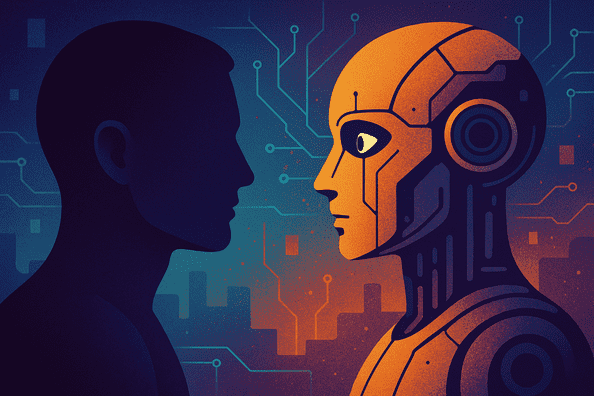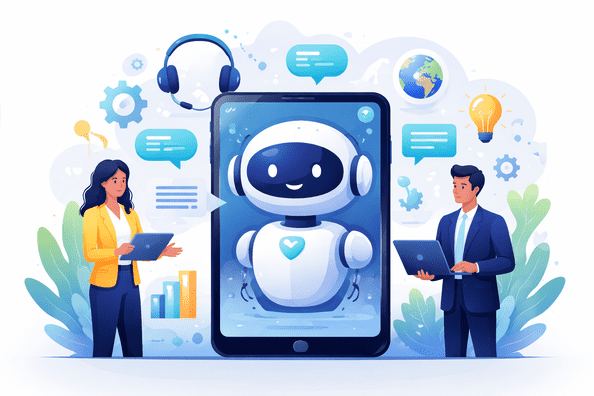In the rapidly evolving landscape of artificial intelligence, few companies have captured the attention of both technologists and ethicists quite like Anthropic. This San Francisco-based AI safety and research company has emerged as a formidable force in the artificial intelligence sector, positioning itself as a responsible alternative to more aggressive AI development approaches. Founded in 2021 by former OpenAI executives, Anthropic has quickly risen to become one of the most valuable AI startups in the world, with a staggering valuation of $61.5 billion as of 2025.
What sets Anthropic apart in the crowded AI market is not just its technical capabilities, but its unwavering commitment to AI safety, transparency, and ethical development. The company’s flagship product, Claude, represents a new generation of AI assistants built with safety at its core, incorporating innovative techniques like Constitutional AI to ensure helpful, harmless, and honest interactions. This comprehensive examination explores the company’s founding story, revolutionary approach to AI development, groundbreaking research, and its strategic position in shaping the future of artificial intelligence.
Table of Contents
- Introduction
- The Genesis of Anthropic: A Mission-Driven Beginning
- Revolutionary Funding: Building the Financial Foundation
- Claude: The Constitutional AI Assistant
- The Claude Model Family: Tailored for Every Need
- Technical Innovation: Beyond the Models
- Safety-First Approach: Redefining AI Development
- Enterprise Adoption and Practical Applications
- Revenue Growth and Market Position
- Competitive Landscape and Market Position
- Global Expansion and International Strategy
- Research and Development: Pushing the Boundaries
- Future Outlook and Strategic Vision
- Conclusion: Shaping the Future of Responsible AI
The Genesis of Anthropic: A Mission-Driven Beginning
The story of Anthropic begins with a fundamental disagreement about the direction of AI development. In 2021, seven former employees of OpenAI, led by siblings Dario and Daniela Amodei, made the bold decision to leave their prestigious positions to start something entirely new. This wasn’t just another Silicon Valley startup story driven by entrepreneurial ambition; it was a mission-driven exodus fueled by concerns about AI safety and the responsible development of increasingly powerful AI systems.
Dario Amodei, who had served as OpenAI’s Vice President of Research, brought with him a deep understanding of both the tremendous potential and inherent risks of advanced AI systems. His sister Daniela, formerly OpenAI’s VP of Safety and Policy, complemented this technical expertise with a keen focus on governance and ethical considerations. Together with their team of renowned researchers including Jack Clark and Chris Olah, they established Anthropic with a clear mission: to build AI systems that are reliable, interpretable, and steerable.
The timing of Anthropic’s founding was particularly significant. In 2021, the AI landscape was characterized by a race to develop increasingly powerful models, often with safety considerations taking a backseat to capability advancement. The founders recognized that this approach could lead to unintended consequences as AI systems became more sophisticated and widely deployed. Their vision was to demonstrate that it was possible to develop cutting-edge AI while maintaining rigorous safety standards throughout the development process.
From its inception, Anthropic structured itself differently from typical tech startups. The company incorporated as a Delaware public-benefit corporation (PBC), a legal structure that enables directors to balance financial interests with public benefit purposes. This governance model reflects the company’s commitment to prioritizing societal impact alongside commercial success, ensuring that profit motives don’t override safety considerations.
Revolutionary Funding: Building the Financial Foundation
Anthropic’s approach to funding has been as innovative as its approach to AI development. The company has raised an unprecedented $14.3 billion in total funding, making it one of the most well-capitalized startups in history. This massive influx of capital reflects both the enormous potential of AI technology and the significant computational resources required to compete at the frontier of AI development.
The funding journey began with an unconventional start. In 2022, Anthropic raised $580 million, with the majority coming from Sam Bankman-Fried and his FTX colleagues, who were aligned with the effective altruism movement’s focus on existential risk mitigation. While FTX’s subsequent bankruptcy created uncertainty, it also demonstrated the resilience and attractiveness of Anthropic’s mission-driven approach.
The real breakthrough came with strategic investments from tech giants Amazon and Google. Amazon’s partnership, announced in September 2023, involved a commitment of up to $4 billion, with the company later maxing out this investment and adding another $4 billion, bringing Amazon’s total investment to $8 billion. This partnership goes beyond simple funding; it includes agreements for Anthropic to use Amazon Web Services as its primary cloud provider and to utilize Amazon’s AI chips for training and running its models.
Google’s investment of $2 billion further validated Anthropic’s approach and provided additional resources for scaling operations. These strategic partnerships offer more than capital; they provide access to critical infrastructure and distribution channels that are essential for competing in the AI market.
The most recent funding milestone came in March 2025, when Anthropic raised $3.5 billion in its Series E round at a $61.5 billion post-money valuation. Led by Lightspeed Venture Partners, this round included participation from prestigious investors such as Fidelity Management & Research Company, General Catalyst, and Salesforce Ventures. This valuation places Anthropic among the most valuable private companies in the world, reflecting investor confidence in both its technology and its approach to responsible AI development.
Claude: The Constitutional AI Assistant
At the heart of Anthropic’s offering is Claude, an AI assistant that represents a paradigm shift in how AI systems are designed and trained. Named either after mathematician Claude Shannon or chosen as a male name to contrast with female AI assistants like Alexa and Siri, Claude embodies Anthropic’s commitment to building helpful, harmless, and honest AI systems.
What makes Claude unique is its foundation in Constitutional AI (CAI), a groundbreaking approach developed by Anthropic’s research team. Constitutional AI represents a fundamental shift from traditional AI training methods by incorporating a set of principles or “constitution” that guides the model’s behavior. Instead of relying solely on human feedback to identify harmful outputs, the system uses a defined set of rules and principles to self-supervise and improve its responses.
The constitutional approach draws inspiration from various sources, including the Universal Declaration of Human Rights and other foundational documents that embody human values. This framework enables Claude to reason about ethical considerations and potential harms in real-time, rather than simply memorizing appropriate responses to specific scenarios. The result is an AI system that can navigate complex ethical situations with nuanced understanding while maintaining helpful and accurate performance.
Claude’s capabilities span a remarkable range of applications. The system excels at natural language processing tasks, including complex reasoning, code generation, creative writing, and data analysis. Its multimodal capabilities allow it to process and understand images alongside text, making it valuable for tasks ranging from document analysis to visual content creation.
The Claude Model Family: Tailored for Every Need
Anthropic has developed multiple versions of Claude to serve different use cases and computational requirements. The current Claude family includes several specialized models, each optimized for specific applications and performance characteristics.
Claude 3, released in March 2024, introduced three distinct models: Opus, Sonnet, and Haiku. Opus represents the most powerful model in the family, designed for complex tasks requiring deep reasoning and analysis. According to Anthropic’s benchmarks, Opus outperformed competing models from OpenAI and Google on various evaluation metrics, demonstrating superior performance in areas such as undergraduate-level expert knowledge, graduate-level reasoning, and mathematical problem-solving.
Sonnet strikes a balance between capability and efficiency, offering strong performance at a more accessible price point. This model has proven particularly popular among developers and businesses that need reliable AI assistance without the computational overhead of the largest models. Haiku, the smallest and fastest model, excels at tasks requiring quick responses and basic reasoning capabilities.
The latest additions to the family, Claude 3.7 Sonnet and the recently announced Claude Opus 4 and Sonnet 4, represent significant advances in AI capability. Claude Opus 4, in particular, has demonstrated the ability to work autonomously for extended periods, with testing showing continuous coding sessions lasting nearly seven hours compared to the 45-minute limit of previous models. This advancement toward sustained, autonomous work represents a significant step toward AI systems that can serve as true collaborative partners rather than simple tools.
Technical Innovation: Beyond the Models
Anthropic’s technical contributions extend far beyond the Claude models themselves. The company has pioneered several breakthrough techniques that are advancing the entire field of AI safety and interpretability.
One of the most significant contributions is the development of interpretability research techniques that allow researchers to peer inside AI models and understand how they process information. Using methods inspired by neuroscience, Anthropic has developed approaches to trace the specific neural pathways that activate when models perform different tasks. This “circuit tracing” technique has revealed fascinating insights about how AI systems actually work, including evidence that models sometimes plan ahead and work backward from desired outcomes.
The company’s research has also uncovered evidence that multilingual AI models process information in a conceptual space before converting it to specific languages, suggesting a more sophisticated internal representation than previously understood. These findings have important implications for AI safety, as they provide insights into how models might behave in novel situations and how their outputs might be predicted or controlled.
Anthropic has also contributed to the development of scaling laws, mathematical principles that describe how AI model performance improves with increased computational resources, data, and model size. These insights help the entire AI community understand how to efficiently allocate resources for AI development and predict the capabilities of future systems.
Safety-First Approach: Redefining AI Development
What truly distinguishes Anthropic from its competitors is its systematic approach to AI safety. Rather than treating safety as an afterthought or constraint on development, the company has made safety considerations central to every aspect of its work.
The company’s Responsible Scaling Policy represents a novel approach to AI development that adapts safety measures as model capabilities increase. This policy establishes specific capability thresholds and corresponding safety requirements, ensuring that safety measures keep pace with advancing capabilities. When models reach certain performance levels, additional safety testing and mitigation measures are automatically triggered.
Anthropic’s approach to safety extends beyond technical measures to include governance and policy considerations. The company actively engages with policymakers, researchers, and civil society organizations to promote industry-wide safety standards. This collaborative approach recognizes that AI safety is not just a technical challenge but a societal one that requires broad coordination and shared standards.
The company’s Long-Term Benefit Trust represents another innovative governance mechanism designed to ensure that Anthropic’s mission remains aligned with long-term human welfare. This trust structure provides oversight and guidance to help the company navigate potential conflicts between short-term commercial pressures and long-term safety considerations.
Enterprise Adoption and Practical Applications
Despite its focus on safety and research, Anthropic has achieved remarkable commercial success with Claude being adopted by thousands of businesses across various industries. The company’s enterprise customers span from fast-growing startups to global corporations, demonstrating the practical value of its safety-first approach.
Major enterprise customers include technology companies like Zoom, Snowflake, and Pfizer, which use Claude for various applications ranging from customer service to research and development. The software development sector has been particularly enthusiastic about Claude’s capabilities, with companies like Replit reporting 10x revenue growth after integrating Claude into their development tools.
Healthcare and pharmaceutical companies have found Claude particularly valuable for complex analytical tasks. Novo Nordisk, the company behind Ozempic, has used Claude to reduce clinical study report writing from 12 weeks to just 10 minutes, demonstrating the transformative potential of AI in regulated industries where accuracy and reliability are paramount.
The financial services sector has also embraced Claude, with Thomson Reuters integrating the technology into their CoCounsel platform to assist tax professionals. These applications in highly regulated industries underscore the value of Anthropic’s safety-focused approach, as these sectors require AI systems that are not only capable but also reliable and transparent.
Revenue Growth and Market Position
Anthropic’s commercial success has been remarkable, with the company achieving significant revenue milestones in a relatively short time. The company’s annual recurring revenue reached $3 billion as of May 2025, representing extraordinary growth from just $10 million in 2022. This 300-fold increase in revenue over three years demonstrates both the market demand for AI capabilities and the effectiveness of Anthropic’s approach.
The revenue growth has been particularly impressive when compared to competitors. While Anthropic still trails OpenAI in overall revenue, the company’s growth trajectory suggests it is rapidly closing the gap. The company’s focus on enterprise customers and high-value use cases has enabled it to command premium pricing for its services, contributing to strong revenue per customer metrics.
The recent $3 billion revenue milestone represents more than just financial success; it validates the market demand for AI systems that prioritize safety and reliability. Enterprises are demonstrating their willingness to pay premium prices for AI solutions that meet rigorous safety and compliance standards, supporting Anthropic’s thesis that responsible AI development can be both technically superior and commercially successful.
Competitive Landscape and Market Position
In the highly competitive AI market, Anthropic has carved out a distinctive position through its safety-first approach and technical excellence. While the company competes directly with OpenAI, Google, and Microsoft, its differentiated approach has attracted customers and partners who prioritize reliability and transparency over raw performance alone.
The competitive landscape reveals interesting dynamics in market positioning. According to recent market analysis, Anthropic holds approximately 3.91% of the generative AI market, positioning it as a significant player despite being younger than many competitors. While OpenAI maintains a larger market share at approximately 17%, Anthropic’s rapid growth and distinctive positioning suggest it is well-positioned to continue gaining market share.
The company’s partnerships with Amazon and Google provide significant competitive advantages, including access to massive computational resources and global distribution channels. These relationships enable Anthropic to compete with larger, more established players while maintaining its focus on safety and research.
Independent evaluations have consistently ranked Claude among the top-performing AI models. The Hallucination Index, which evaluates AI models for accuracy and performance, found that Claude 3.5 Sonnet outperformed competitors across various context lengths and use cases. These technical achievements, combined with the company’s safety focus, have established Anthropic as a leader in what some observers call the “safety race to the top.”
Global Expansion and International Strategy
Recognizing the global nature of AI development and deployment, Anthropic has embarked on an ambitious international expansion strategy. The company’s recent decision to establish its first Asia-Pacific office in Tokyo reflects its commitment to serving international markets while navigating the complex regulatory landscape surrounding AI deployment.
The Tokyo office opening is particularly strategic, as Japan has emerged as a key market for enterprise AI adoption. Japanese companies including Rakuten, NRI, and Panasonic have embraced Claude for its coding capabilities and safety-first approach. The Japanese market’s emphasis on precision and reliability aligns well with Anthropic’s positioning, creating opportunities for significant growth in the region.
European expansion has also been a priority, with Claude being launched in multiple European markets. The company’s approach to international expansion emphasizes compliance with local regulations and cultural sensitivity, recognizing that AI deployment must be adapted to different legal and social contexts.
The global expansion strategy also includes partnerships with local consulting firms and system integrators who can help enterprises implement AI solutions effectively. These partnerships provide local expertise while maintaining Anthropic’s standards for safety and reliability.
Research and Development: Pushing the Boundaries
Beyond its commercial products, Anthropic continues to be a leader in AI research, contributing breakthrough discoveries that advance the entire field. The company’s research publications cover a wide range of topics, from fundamental questions about AI capabilities to practical techniques for improving safety and reliability.
Recent research has focused on AI interpretability, with groundbreaking work that allows researchers to trace the specific neural pathways activated during AI model operations. This research has revealed surprising insights about how AI models process information, including evidence that they sometimes plan ahead and work backward from desired outcomes rather than simply processing information sequentially.
The company’s research on Constitutional AI has also advanced understanding of how AI systems can be trained to adhere to ethical principles without sacrificing performance. This work has implications beyond Anthropic’s own products, potentially influencing how the entire industry approaches AI safety and alignment.
Anthropic’s research team regularly publishes their findings in academic journals and presents at major conferences, contributing to the broader scientific understanding of AI systems. This commitment to open research, balanced with appropriate safety considerations, reflects the company’s mission to advance the field while maintaining responsible development practices.
Future Outlook and Strategic Vision
Looking toward the future, Anthropic faces both tremendous opportunities and significant challenges. The company’s vision extends beyond current AI capabilities toward artificial general intelligence (AGI) that is safe, beneficial, and aligned with human values.
The development roadmap includes continued improvements to Claude’s capabilities, with particular focus on extended reasoning, improved factual accuracy, and enhanced multimodal understanding. The company is also working on new interaction modalities, including voice and visual interfaces that could make AI assistance more natural and accessible.
Safety remains central to Anthropic’s future plans, with ongoing research into advanced safety techniques and governance mechanisms. As AI systems become more capable, the company recognizes that safety measures must evolve accordingly, requiring continuous innovation in both technical and governance approaches.
The international expansion strategy will likely accelerate, with new offices and partnerships planned for key markets worldwide. This expansion must balance growth opportunities with the company’s commitment to responsible deployment and local regulatory compliance.
Conclusion: Shaping the Future of Responsible AI
Anthropic represents more than just another AI company; it embodies a vision for how artificial intelligence can be developed and deployed responsibly while maintaining technical excellence. The company’s journey from a small group of concerned researchers to a $61.5 billion enterprise demonstrates that prioritizing safety and ethics can be both technically superior and commercially successful.
The success of Claude and the broader Anthropic platform provides a compelling proof point that AI systems can be powerful, useful, and safe simultaneously. This achievement has implications beyond the company itself, potentially influencing how the entire industry approaches AI development and deployment.
As artificial intelligence continues to reshape industries and society, Anthropic’s model of responsible development offers a path forward that balances innovation with safety, commercial success with ethical considerations, and technical advancement with human values. The company’s continued growth and influence suggest that this approach may well define the future of artificial intelligence development.
The story of Anthropic is still being written, but its impact on the AI landscape is already profound. By demonstrating that safety-first AI development can achieve both technical excellence and commercial success, the company has established a new paradigm for the industry. As AI capabilities continue to advance, Anthropic’s approach to responsible innovation will likely become increasingly important, making it a company to watch as the artificial intelligence revolution unfolds.
Through its innovative technology, principled approach, and demonstrated success, Anthropic has positioned itself as a leader in shaping the future of artificial intelligence. The company’s commitment to building AI systems that are helpful, harmless, and honest provides a roadmap for how the technology industry can navigate the challenges and opportunities ahead while maintaining its responsibility to society and humanity.



